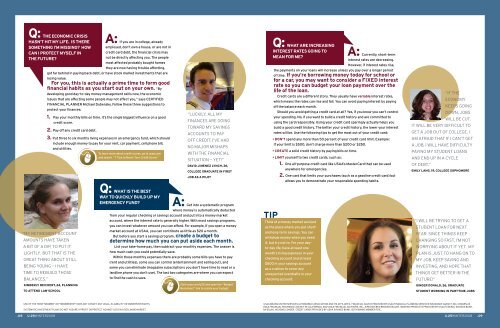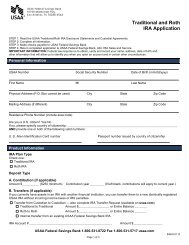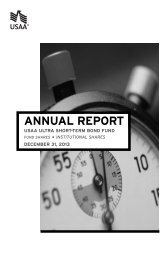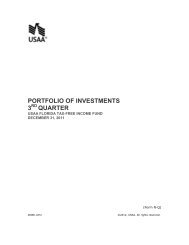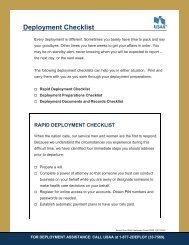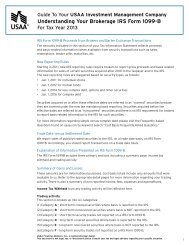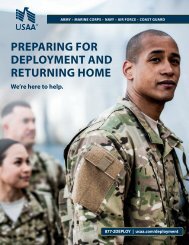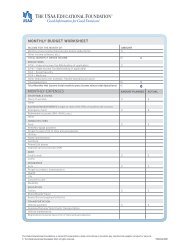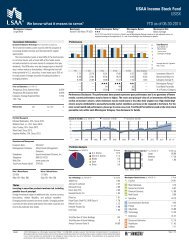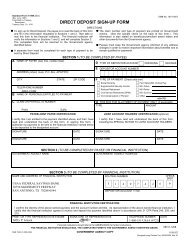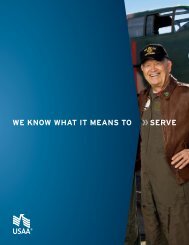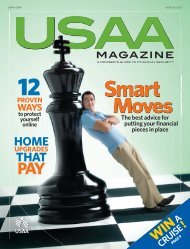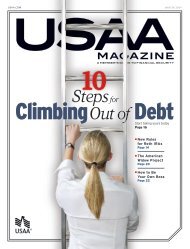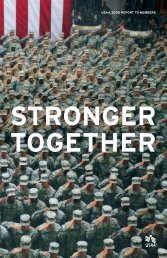OWn COURSE - USAA
OWn COURSE - USAA
OWn COURSE - USAA
Create successful ePaper yourself
Turn your PDF publications into a flip-book with our unique Google optimized e-Paper software.
Q: The economic crisishasn’t hit my life. Is theresomething I’m missing? Howcan I protect myself inthe future?A: If you are in college, alreadyemployed, don’t own a house, or are not incredit card debt, the financial crisis maynot be directly affecting you. The peoplemost affected probably bought homesthey are now having trouble affording,got far behind in paying back debt, or have stock market investments that arelosing value.For you, this is actually a prime time to form goodfinancial habits as you start out on your own. “Bydeveloping good day-to-day money management skills now, the economicissues that are affecting some people may not affect you,” says CERTIFIEDFINANCIAL PLANNER Michael Dubensky. Follow these three suggestions toprotect your finances:1. Pay your monthly bills on time. It’s the single biggest influence on a goodcredit score.2. Pay off any credit card debt.3. Put three to six months living expenses in an emergency fund, which shouldinclude enough money to pay for your rent, car payment, cell phone bill,and utilities.To learn more about credit scores, go to usaa.comand search “7 Tips to Boost Your Credit Score.”“Luckily, all myfinances are goingtoward my savingsaccounts to payoff credit. I’ve hadno major mishapswith the financialsituation — yet!”David Jimenez Lynch, 26,college graduate in firstjob as a pilotQ: What are increasinginterest rates going tomean for me?A: Currently, short-terminterest rates are decreasing.However, if interest rates rise,the payments on your loans will increase unless you pay over a longer periodof time. If you’re borrowing money today for school orfor a car, you may want to consider a fixed interestrate so you can budget your loan payment over thelife of the loan.Credit cards are a different story. They usually have variable interest rates,which means the rates can rise and fall. You can avoid paying interest by payingoff the balance each month.Should you avoid getting a credit card at all? Yes, if you know you can’t controlyour spending. No, if you want to build a credit history and are committed tousing the card responsibly. Using your credit card sparingly actually helps youbuild a good credit history. The better your credit history, the lower your interestrates will be. Use the following tips to get the most out of your credit card:• Don’t spend any more than 50 percent of your credit card limit. Example:If your limit is $500, don’t charge more than $200 or $250.• Create a solid credit history by paying bills on time.• Limit yourself to two credit cards, such as:1. One all-purpose credit card like <strong>USAA</strong>’s MasterCard that can be usedanywhere for emergencies.2. One card that limits your purchases (such as a gasoline credit card) butallows you to demonstrate your responsible spending habits.“If theeconomykeeps goingdown, jobswill be cut.It will be very difficult toget a job out of college. Iam afraid that if I can’t geta job, I will have difficultypaying my student loansand end up in a cycleof debt.”Emily Lang, 19, college sophomore“My retirement accountamounts have takena bit of a dip, to put itlightly. But that is thegreat thing about stillbeing young — I havetime to rebuild thosebalances.”Q: What is the bestway to quickly build up myemergency fund?A: Get into a systematic programwhere money is automatically deductedfrom your regular checking or savings account and put into a money marketaccount, where the interest rate is generally higher. With most savings programs,you can invest whatever amount you can afford. For example, if you open a moneymarket account at <strong>USAA</strong>, you can contribute as little as $20 a month.But before you start a savings program, create a budget todetermine how much you can put aside each month.List your take-home pay, then subtract your monthly expenses. The answer ishow much cash you could potentially save.Within those monthly expenses there are probably some bills you have to pay(rent and utilities), some you can control (entertainment and eating out), andsome you can eliminate (magazine subscriptions you don’t have time to read or alandline phone you don’t use). The last two categories are where you can expectto find the cash to save.TIPThink of a money market accountas the place where you put shortandlong-term savings. You canwithdraw money when you needit, but try not to. For your dayto-daylife, have at least onemonth’s living expenses in yourchecking account and at least$500 in your savings accountas a cushion to cover anyunexpected overdrafts in yourchecking account.“I will be trying to get astudent loan for nextyear. Since things keepchanging so fast, I’m notworrying about it yet. Myplan is just to hang on tomy job, keep saving andinvesting, and hope thatthings get better in thefuture!”Kimberly Reichert, 24, planningto attend law schoolVisit usaa.com/u25 and open the “BudgetWorksheet” link to create your budget.Ginger Donald, 26, graduatestudent working in part-time jobsUse of the term “member” or “membership” does not convey any legal, eligibility or ownership rights.Systematic investment plans do not assure a profit or protect against loss in a declining market.<strong>USAA</strong> means United Services Automobile Association and its affiliates. Financial advice provided by <strong>USAA</strong> Financial Planning Services Insurance Agency, Inc. (known as<strong>USAA</strong> Financial Insurance Agency in California), and <strong>USAA</strong> Financial Advisors, Inc., a registered broker dealer. Banking products provided by <strong>USAA</strong> Federal Savings Bank,an equal housing lender. Credit cards provided by <strong>USAA</strong> Savings Bank. Both Banks Member FDIC..08 U.25WINTER2008 U.25WINTER2008 .09


